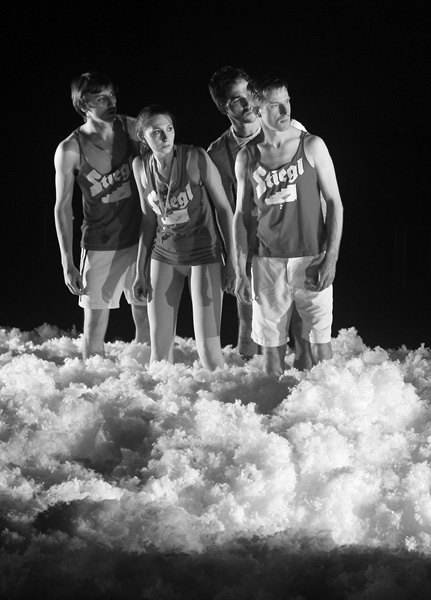
“SPORTS PLAY” BY ELFRIEDE JELINEK
first performed on July 11, 2012
live at LICA (Nuffield Theatre), Lancaster, UK
performed twelve times in 2012
JUST A MUST / VANDA BUTKOVIC
Penny Black, Berislav Juraic, Karen Jürs-Munby, Simon Donger, Meni Kourmpeti, Ana Vilar, Jessica Thanki, Adrienne Smook, Michael Cole, Nina Hatchwell, Denise Heinrich Lane, Tom Lyall, Matt Ray-Brown, Delia Remy, Giorgio Spiegelfeld
458444484i458444484n458444484f458444484o458444484@458444484j458444484u458444484s458444484t458444484a458444484m458444484u458444484s458444484t458444484.458444484c458444484o458444484m
justamust.com
“SPORTS PLAY” BY ELFRIEDE JELINEK
JUST A MUST / VANDA BUTKOVIC
Coinciding with the London 2012 Olympics, Just a Must, in partnership with Austrian Cultural Forum London, staged the English-language premiere of Elfriede Jelinek’s seminal play “Ein Sportstück” (here translated by Penny Black as “Sports Play”).
In this text, Jelinek explores the marketing and sale of human bodies and emotions in sports with angry wit, questioning our obsession with body image and high performance at any cost. Sport is seen as a medium for fanaticism, as a form of war in peacetime. I decided to stage the text with a group of seven performers, six of whom, in addition to individual roles, also act as the Chorus and are present on stage throughout the play. The Chorus changes from being commentators, to team, to crowd. Performatively, I also played with shifting between the performers playing “themselves,” being “text bearers” and becoming “characters,” underlining the visible construction of characters that is also evident in Jelinek’s text itself.
When working on the extended part of the Chorus, the choric performance of the text was treated as musical composition, trying to avoid psychological illustration and instead working with variations of rhythm, tempo, acceleration and deceleration. The result was a kind of Olympic feat of the performers, not only in terms of memorizing Jelinek’s difficult linguistic gymnastics but in performing it chorally, as an ensemble in a highly disciplined fashion.
The production also strove to bring out the humor in the text. Jelinek, who considers herself a comic writer, often complains that many productions and frequently the reception of her texts miss the humor in them. Discovering the humor in her writing, we found, is actually something that comes relatively easy to British performers, as there is such a great tradition of punning and irony.
Stage design, consisting of 160kg of white toy stuffing, created an ever-changing landscape in performance. Depending on its use and context in each scene, the “fluff,” as it was nicknamed, may bring up associations of snowy mountains, sports fields or a battlefield, the candyfloss sugar coating of the Olympics or the “stuff” that artificially enhanced bodies are made of. It was ultimately left up to the audience how they chose to read it at any given moment. The toy stuffing also underscored the theme of the commercial manufacture of sports events by corporations and the media.